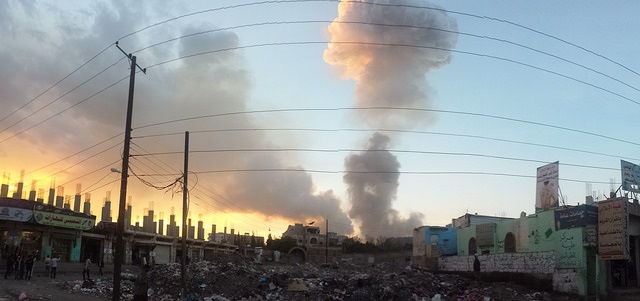UN Says Yemen is “the World’s worst humanitarian disaster”

Yemen is in the grip of an unprecedented cholera epidemic, killing one person per hour.
This is yet another health crisis in the Arab world’s poorest country, fuelled by the war between forces loyal to the government of President Abdrabbuh Mansour Hadi, and those allied to the Houthi rebel movement.
The conflict is in its third year now and has left the country on the verge of total collapse. Aid workers have reported near-famine conditions, crippled infrastructure and next to no access to clean water and sanitation systems. According to the United Nations (UN), Yemen is now “the world’s worst humanitarian disaster”.
It seems there is no fathomable end to the crisis given that neither side appears close to a decisive military victory. The conflict has its roots in the failure of the political transition that was supposed to bring stability to Yemen following an uprising that forced its long time authoritarian president, Ali Abdullah Saleh, to step down.
Abdrabbuh Mansour Hadi took over, another authoritarian leader who struggled to control a variety of problems including corruption, unemployment and attacks by al-Qaeda in the country. Disillusioned with the transition, many ordinary Yemenis- including Sunnis- began to turn to the Houthis- a mostly Shia- rebel movement and by the beginning of 2015, the Houthis had taken over the capital city of Sanaa, forcing the new leader President Hadi to flee the country.
So far in the war more than 7600 people have been killed, the majority in airstrikes by the Saudi-led multinational coalition that backs the president. The coalition also receives logistical and intelligence support from the US, UK and France. Despite the extravagant airstrikes and naval blockades by the coalition, they have been unsuccessful in dislodging the rebels from their strongholds, including the capital city.
The UN has attempted to organise three rounds of peace talks. In mid 2016, both sides were under pressure and hopes were high that some kind of agreement could be made. But within three months the talks collapsed and triggered an escalation in violence and civilian casualties. Today, it’s near impossible to get food and supplies into the country. Experts say the cholera outbreak will continue to escalate as long as the borders and the ports of Yemen stay closed.
The Saudi-led coalition recently closed the country’s main airport and is preventing journalists and health workers from entering the country. The coalition was also reported to have closed the port, but Saudi sources insist it is the Houthi rebel fighters who are using the Yemeni port to import weapons. They also claim Houthis are responsible for destroying key infrastructure at the port, worsening food shortages.
Oxfam is calling for an immediate ceasefire to allow relief workers to attempt to halt cholera’s deadly spread, however neither side seem to be willing to negotiate. There seems to be no foreseeable solution to the conflict in Yemen, and while the battle continues to rage, the death toll will continue to rise.